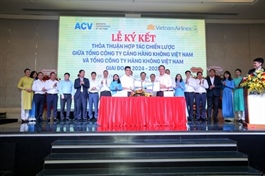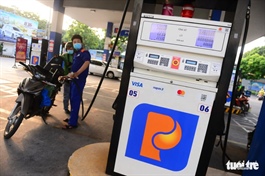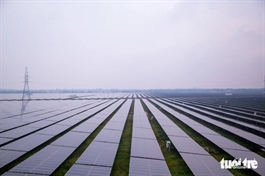Việt Nam poised for semiconductor investment boom: MPI
Việt Nam poised for semiconductor investment boom: MPI
Việt Nam has been laying essential groundwork for the development of the semiconductor industry, including solid and soft infrastructure, policy mechanisms, research and development, strategy and human resources to lead and embrace the upcoming semiconductor investment influx.
|
Prime Minister Phạm Minh Chính (second from the left) visits the semiconductor chip production line of Hana Micro Vina Co Ltd in Bắc Giang Province. — VNA/VNS Photo Dương Giang |
Semiconductor industry is one of the strategically important industries globally. The global semiconductor market is expected to experience double-digit growth in the coming years, aiming for a milestone of US$1 trillion by 2030.
Việt Nam has clear and specific directions and action plans for the development of the semiconductor industry. Acknowledged as a nation fostering a dynamic innovation ecosystem, Việt Nam's rapid strides in the digital economy and substantial growth in the high-tech sector have captured the attention of numerous global corporations, enticing them to invest in its burgeoning semiconductor industry.
In an interview with the Government’s online newspaper baochinhphu.vn at the start of 2024, Minister of Planning and Investment Nguyễn Chí Dũng talked about the important tasks given to different government departments, especially the Ministry of Planning and Investment (MPI), in getting ready for investments in Việt Nam's semiconductor industry. The Government specifically asked the Ministry of Information and Communications to create a plan for developing the semiconductor industry in Việt Nam until 2030, with the final stages of drafting currently underway.
Meanwhile, MPI has been entrusted by the Government and the Prime Minister to lead the human resources development project for the semiconductor industry in Việt Nam until 2030. The specific objective is to train 50,000 semiconductor engineers, reflecting the nation's commitment to nurturing skilled professionals in this critical field.
Việt Nam has also established the National Innovation Centre (NIC) and collaborated with two of the largest chip design corporations in the United States, Synopsys and Cadence, to set up a chip research and design centre within NIC's facilities.
Infrastructure readiness
In addressing the crucial aspect of infrastructure, Minister Dũng highlighted the meticulous preparations made by localities. Enhancements in land infrastructure, with active efforts to free up land for semiconductor enterprises, have been a priority. Simultaneously, strategic transportation infrastructure connecting economic centres, seaports and airports is being enhanced. The focus extends to preparing for issues related to information technology, electricity, water and social infrastructure for the workforce in the semiconductor industry.
These preparations underscore the government's commitment to creating a conducive environment for semiconductor investments and its determination to actively participate in the global semiconductor value chain, the Minister said.
Dũng underscored the significance of human resources development as a primary challenge in the semiconductor industry. He outlined the MPI's progress in the final stages of designing the human resources development project. This initiative aims to train a substantial number of 50,000 engineers, 1,000 master's degree holders, and 100 Ph.D. researchers in the semiconductor industry by 2030. The plan includes potential domestic and international training programmes, emphasising collaboration with universities and institutions.
To realise these goals, Việt Nam has forged a collaborative agreement with the University of Arizona, a prominent institution specialising in semiconductor education in the United States. The Minister highlighted the importance of mobilising diverse resources, including state funds, private sector support and non-refundable aid, to ensure the successful implementation of the project.
With increasing competition for foreign direct investment (FDI) and the implementation of global minimum tax in 2024, Minister Dũng outlined Việt Nam's measures to support domestic and foreign enterprises participating in the semiconductor production and supply chain. The government aims to develop a strategic roadmap, ensure rapid implementation to meet human resource demands, and improve institutions and policies.
Enterprises' proposals, such as preferential tax rates, intellectual property protection, R&D centre mechanisms, and digital infrastructure development, are being actively considered. Minister Dũng expressed confidence that Việt Nam is on the right path, making timely decisions to embrace the significant semiconductor industry wave currently underway.


























